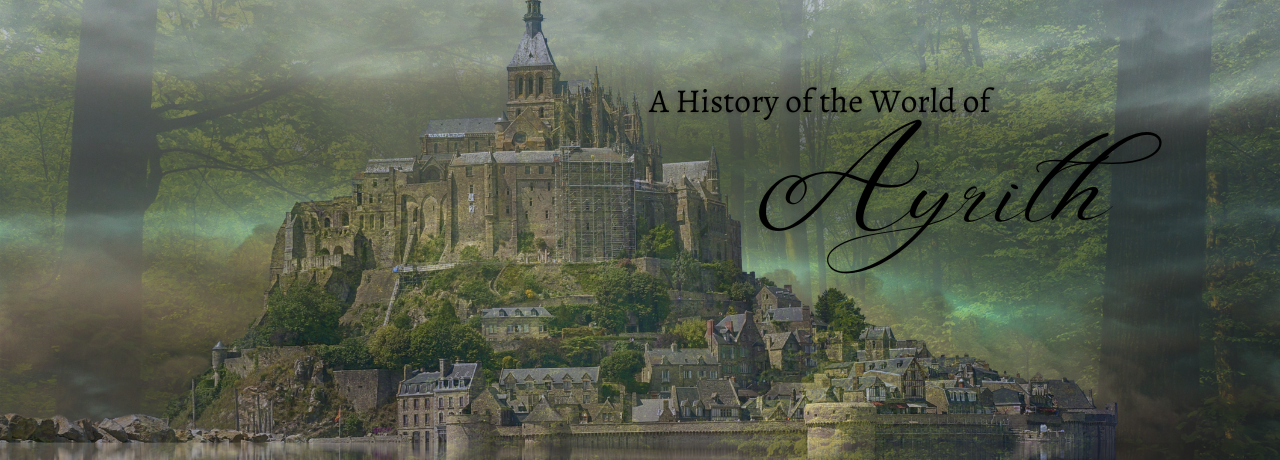The Gods of Ayrith
Summary
It is commonly believed that the gods walked among the mortals of the world during the First Era. During this time they taught mortals how to be more godlike, assisted in the creation of civilization, and introduced magic to the mortal world by having children with mortals.
The gods listed below are listed by their most common name, and other, regional names have been included with their translations into Trade for a better understanding of the names' origins.
Major Gods
Gods who are known by the same name and with the same identifying myth throughout the world.
- Luttuv - known variously as the Great Goddess, Mother Goddess, or Mother of the Gods; she is said to have birthed all the other gods of Ayrith with Epofsuk, her only partner
- Epofsuk - known variously as the Great God, Father God, or Father of the Gods; is said to have fathered all of the gods with Luttuv and is never depicted with any other partner but her
- Cafk - god of winter; his holiday is celebrated on the longest night of the year across Ayrith in order to ensure the seasons change and the light returns
- Ayzy - goddess of springtime; her holiday is celebrated on the spring equinox in all areas of Ayrith and is often a celebration of fertility
- Tysy - goddess of the summertime; she is celebrated on the longest day of the year in order to keep the crops growing strong and well, as well as to ward off bad weather
- Lozk - god of the harvest and the autumn; he is celebrated with harvest festivals throughout the season so that he can bring the thanks of the people to his siblings who guard the other seasons
Specialized Gods
Gods whose names and stories vary by country or region.
- Eryf - the god of death and disease; he is also believed to be the first to bring the magic of necromancy to the mortal world; forms of worship are varied and often obscurred due to the connection to necromancy, but he is worshipped respectfully in Nairiume among the Asirim; also known as Bringer of Death, Soulmover, and The Lifeless God
- Durasyan - the god of love, pleasure, and sometimes fertility; sometimes depicted in the female form and called Danya; also known as the Loving God, Bliss, and the Lover
- Quelin - the god of the sea and protector of all those who require the sea to make a living; also known as the Great Whale, Sea Shepherd, and Wave
- Mahault - the god of war; he is believed to protect warriors from death or serious injury; some look to him for victory, though because those on both sides of a conflict would be doing so, that is not the primary goal of prayers and worship of him; also called the Warrior God, Soulguardian, and The Bloodied God
- Savjuvi - the god of magic; he is looked to as a teacher of magical ability, not as the exclusive father of magic; also known as the Sorcerer, the Mage God, and Sparkmaker
- Rutsav - the god of healing; worshipped by healers across Ayrith and prayed to by all for general health; also called the God of Health, Healer of All, and the Herbalist
Minor Gods
Gods who are only known on a local level.
- Beri - known in parts of Algoma as a protector of artisans
- Nymbs - god of the night; followed only by theives
- Favi - goddess of hope worshipped in some areas of Phelin
- Cari - goddess of hunting known in parts of Mahlon
- Mirka - protector of travelers in Berk
- Gotzon/Gitta - god/goddess of teachers, students, and learning once worshipped in Berk
- Raiofsi - a god of royalty worshipped by some royal families who claim to have been chosen by him to lead
Historical Basis
It is commonly believed that the gods walked among mortals due to the fact that they have very similar names and stories throughout the world. Documentation from various periods in history show that these similarities have existed for at least as long as written history, and mostly likely stems from even older oral history.
Variations & Mutation
The regional differences in the stories of the various gods is believed to come from how the stories were passed down before being physically recorded. It is also speculated that some gods performed different actions in different places, not keeping their activities the same everywhere they went. Some of the people they interacted with would have needed different forms of help from different gods at different times. Some gods may also not have visited all regions of the world and therefore their stories may have come from elsewhere and may have been changed to fit a local need.
Cultural Reception
The idea that the gods once traveled Ayrith and lived and walked among mortals is commonly accepted. It is also the commonly accepted origin of the various types of magic, which are believed to have come from different gods. The variety of gods is believed to be responsible for the variety of magic, though which god is the origin of which form of magic is not commonly agreed upon.
In Literature
The stories of the gods are a common theme in literature throughout the world, as are references to them in general.
In Art
The gods are often portrayed in similar ways through various forms of art across the world.



